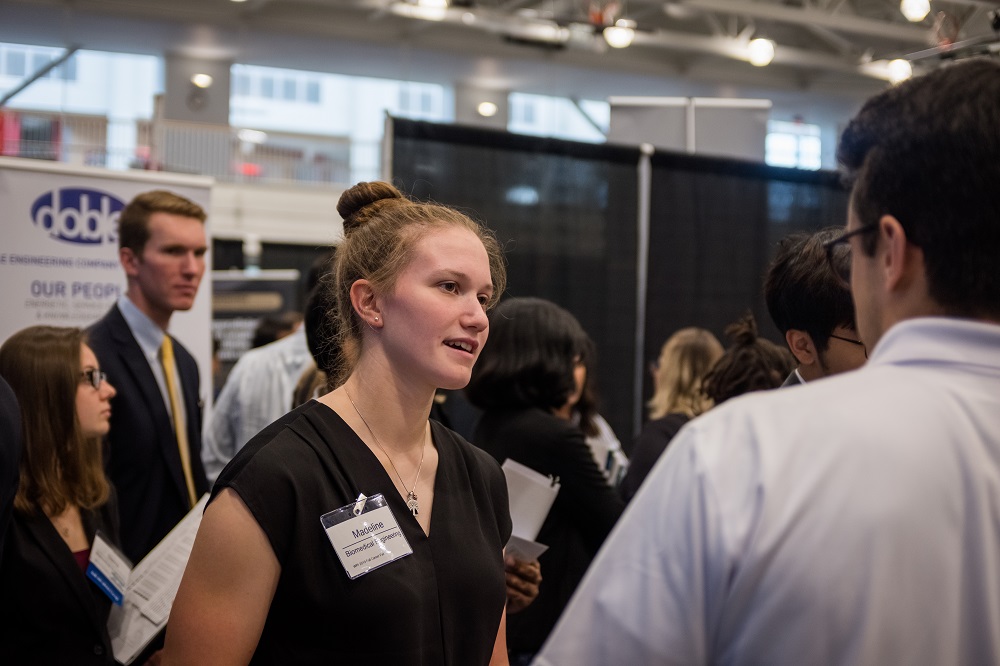WPI ranks high in careers and wages
WPI’s Career Development Center just released the results of the 2013 Post-Graduation Report, and findings show that 92 percent of the graduating class last year had positive career outcomes soon after graduation. And graduates in several majors averaged starting salaries above the national average.
“There are emerging national standards, and career centers and universities are looking more carefully at career outcomes,” says Steve Koppi, executive director of the CDC. “Overall, for a STEM-oriented school of WPI’s size, we are doing really, really well.”
“Our approach is to collect data that is valuable to our students,” he says. But that’s easier than it sounds. Calling the data collection process an “all hands on deck” venture. Koppi says staff worked for months to contact the students. Faculty helped track down students, and staff used emails to ask students to complete an online survey, paper forms at graduation, and even called about 200 students’ homes to track down almost all the bachelor’s, master’s, and doctoral graduates of 2013. When they did, they got a remarkable 89 percent reply rate of 1,555 students. Koppi says a typical survey might yield a 40 to 60 percent range of response and even those lower returns are statistically significant.
The CDC took a fresh approach to something it has done all along. “The most visible changes in the report include a one-page-per-program display that is easy to digest and shares data for all degrees in that major or program,” says Dave Ortendahl, director of corporate relations for the CDC. “There are some nuanced changes in the methodology and tallying of data to remove assumptions and improve detail and accuracy of the snapshot and data, as well.” Next year, the CDC expects to release the class of 2014’s information by D-Term.
“The post-graduation data gives the WPI community a snapshot of how students are starting their careers after WPI,” says Ortendahl. “Each student or alumnus has, or will have, a professional story, and this data represents that chapter following the achievement of their WPI degree.”
Based on data provided by the 40 percent of students who provided salary information, an average salary for a WPI bachelor’s degree candidate is $60,803, for master’s is $71,649, and for doctoral degrees is $97,167. Some majors offer salaries that exceed the national average. A WPI industrial engineering major earned an average salary of $60,333 compared with a national average of $56,300, while a computer science grad averaged a starting salary of $76,219 compared to the national average of $64,800, says Koppi.
Aware of the emerging trends and changing approach to standards, the CDC was happy to find WPI was right on track with collecting data that’s useful to both students and the university.
But Koppi says the CDC had a slightly different goal than just information collection. “We are doing a census,” he says, “to find out where students are and to be supportive.” For students still looking for a job, the CDC offers assistance.
“We invited them to tell us the results of their job search,” says Koppi. “We wanted as high a knowledge rate as possible, not just a good response rate. The claims we make are solid claims.”
The numbers are used in many ways, he says, and are important to the university, students, and alumni. The information helps students making career decisions and looking at companies and salaries of recent grads. WPI can also use the information to attract employers who are seeking potential employees. In addition, Koppi says the data will be used for comparison among peer institutions (like Northeastern, Rensselaer, MIT, or Carnegie Mellon) so students and employers can see where WPI students end up.
And CDC staff, who work so closely with students during their job searches, find the results heartening. They enjoy hearing about the stellar student who lands a dream job just as much as they like hearing about the student who turns down several excellent offers to pursue a dream that takes him or her in another direction.
“We are very committed to knowing where grads are going and to supporting them,” says Koppi.
BY JULIA QUINN-SZCESUIL


